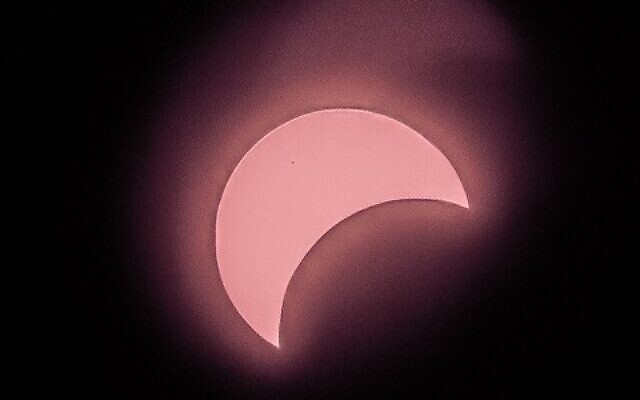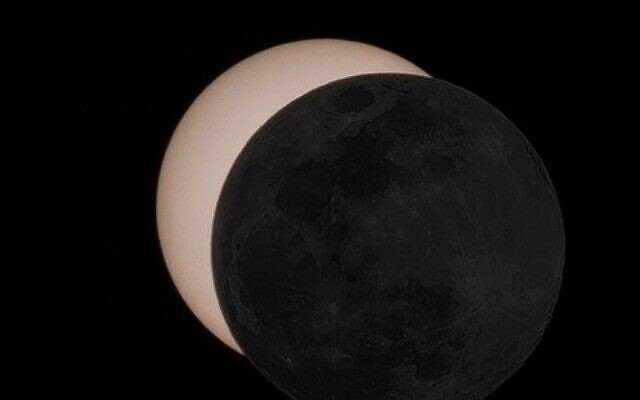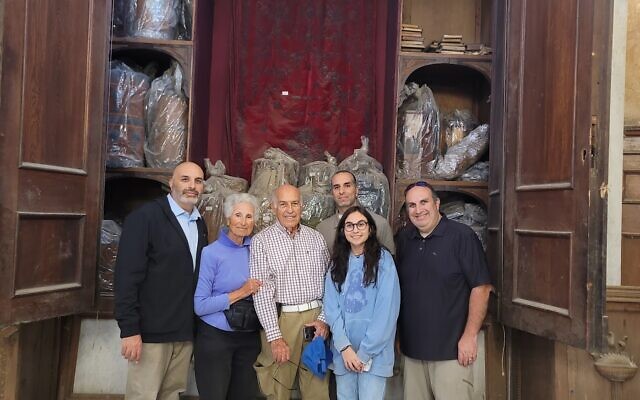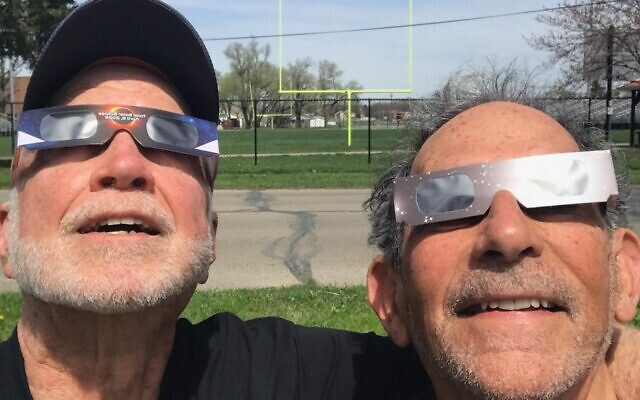Eclipse Mania: Local Professor Weighs In
Atlantans viewed the eclipse with a degree of unity and awe.
After 37 years with the Atlanta Journal-Constitution and now with the AJT, , Jaffe’s focus is lifestyle, art, dining, fashion, and community events with emphasis on Jewish movers and shakers.

At 2 p.m. on Monday, April 8, the world stopped while eyes hid behind colanders and plastic glasses. Some traveled to the direct arc of the solar eclipse while envisioning Carly Simon’s lyrics, “flying Lear jet to Nova Scotia … to see the total eclipse of the sun,” or Bonnie Tyler’s, “Total Eclipse of the Heart.”
Four minutes — where everything went dark. One observer commented, “At least it was a reprieve from war and politics as a brief show of unity.”
Local Georgia Tech professor Morris B. Cohen, of the School of Electrical and Computer Engineering, was all in for the eclipse, and was quoted in the Atlanta Journal-Constitution for his expertise in the natural electricity of the earth including lightning, the electrically charged upper atmosphere, and the radiation-filled space environment.

When asked by the AJT about how he technically evaluated the 2024 eclipse, he explained, “The ionosphere is the border of Earth and space, and it is electrically charged. When the sun sets, its properties drastically change. In 2017, we were recording the type of radio waves that come from lightning, and we found that they bounce/reflect off the totality zone, much the way a radar reflects off an airplane, and this happened because we have a small spot of nighttime surrounded by daytime, which doesn’t otherwise happen. In 2024, we are trying to go deeper, and use this rare opportunity to determine whether the ionosphere is ‘smooth,’ like a polished mirror, or ‘rough,’ like a shaggy carpet. This is a surprisingly fundamental question that affects how we calculate radio waves crossing through the ionosphere between satellites and ground.”
Interestingly, in 2017 he took a team of students to Camp Ramah Darom for an eclipse retreat weekend where they launched a high-altitude balloon.
His day-to-day research falls into three areas:
· Trying to better predict and respond to space weather, which has the potential to wreak havoc on society.
· Improving the reliability of satellite communications, and certain long-range communication systems that are used by the aviation industry and the military.
· Trying to build a novel type of antenna that would allow for antennas to be small yet perform well.
Cohen currently spends one-third of his time in the classroom, and the rest doing research or working with students who are engaged in research.

Ever the scholar, Cohen grew up in Baltimore, before a 13-year stint in the Bay Area where he earned a PhD from Stanford University and worked as a research scientist. His interest in science was likely inspired by his mother, who holds degrees in electrical engineering, and was one of only two female engineers at UCLA upon graduation. She was also the first female with a graduate degree in electrical engineering from Johns Hopkins University. She served as an actuary for the government until she retired. Cohen’s father was an accountant. Both parents grew up in a Karaite community (once a larger sect in Judaism) and fled Egypt to the U.S. as refugees. Here, his young family attends Ohr HaTorah in Toco Hills, and are associate members of Congregation Shearith Israel.
A dare-devilish Cohen said he would go into space travel (if asked) and counts sky diving and bungee jumping among his hobbies. On a more grounded note, he’s an avid chef based on his “woodfire oven for pizzas, bread, kabobs, plus a lot of Middle Eastern food.”

On a different eclipse mission, Peachtree Corners resident and Wharton Business School grad, Jay Bear, ended up in Rushville, Ind., after consulting with experts on minute-to-minute weather conditions, departing Lexington, Ky., in the wee hours for clearer skies. Seven years ago, he ventured to Sky Valley, Ga., for eclipse viewing and made a promise to himself that he would witness the next one because at that time the eclipse was unfortunately obscured by the only cloud in the sky.
His notes on April 8 to the AJT included: “Totally unbelievable! At 98 percent, it feels like early dusk. Getting a bit cooler … At 99 percent, somewhat darker and noticeably cooler. At 100 percent, it’s entirely magical! In the dark, the stars came out, and it got chilly … Then two bright red spots appeared at the bottom of the darkened sun. It stayed ‘total’ for us just under four minutes. I planned this for weeks, and thankfully I was able to keep that promise.”
Jewish comedian Charlie Chaplin summed it up: “When you see the moon, you see the beauty of G-d. When you see the sun, you see the power of G-d.”
On April 8, we saw both.
- News
- Community
- Marcia Caller Jaffe
- Carly Simon
- Bonnie Tyler
- eclipse
- Georgia Tech
- Morris B. Cohen
- School of Electrical and Computer Engineering
- Atlanta Journal Constitution
- Ramah Darom
- Stanford University
- Johns Hopkins University
- UCLA
- Karaite
- Ohr HaTorah
- Congregation Shearith Israel
- Wharton Business School
- Jay Bear



comments